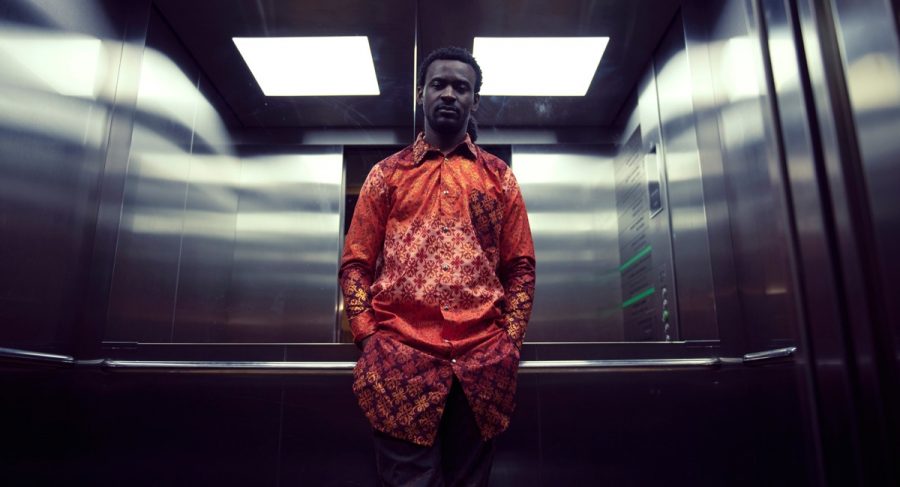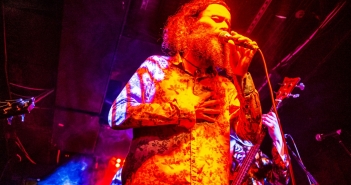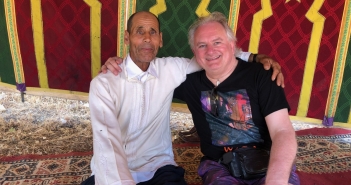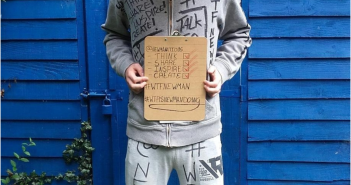We’re living in a time where musical forms and styles are fusing more than ever. However, this is an ancient process that has been happening ever since humans have sang, travelled, and interacted with each other. People have always moved around the world with their songs, dances, instruments, and thus, the music evolves. With technology, this process is faster than at any previous time – you can hear music from anywhere by clicking a button or touching a screen, in an elevator, on the radio, and so on.
I remember between the ages of seven and eleven years old, I went to the church with my grandparents most Sundays. This church was special because it originated from the village and moved to Kinshasa, the capital of Democratic Republic of the Congo. The music was traditional – every row of seats had a bell and a shaker for anyone to play. The big drums in the front had no dedicated drummer – anybody who felt like playing would go in front and play during a song. As kids, we would gather around the drums with sticks and hit them on the side – this could possibly have been my first performing experience.
After the church we’d come home and I would sit on the pillar of the balcony in our house, which was dangerous as there was a twenty-five metre drop to the floor. Obviously I was not allowed to sit there, and my grandfather – who is my biggest influence, looking after me now from the beyond – would give out to me and even give a few slaps to stop me sitting there (this was normal, not child abuse!).
When I started learning the guitar between the age of sixteen and seventeen years of age, I was really interested in learning music that was not from the DR Congo. I had a great mentor who taught me jazz and I enrolled myself into classical music school to learn how to play with my fingers. It is only then I realised why I was so obsessed sitting on the balcony years earlier.
I found out it was the music on the radio that was making me sit on the balcony as I recognised most of the pieces I was hearing students and teachers performing around the school. The pieces were by most of the familiar famous classical composers such as Wolfgang Amadeus Mozart, Ludwig van Beethoven, Johann Sebastian Bach, Antonio Vivaldi, and many others. To this day, whenever I hear their music, the memories of my grandfather, the church, the scents of that time, rush into my body like crazy.
Classical music is truly part of my existence and experience. It is also clearly an art form rooted in the tradition of Western culture, but I believe it is also my traditional music as a human being. I had no idea it was called classical music sitting on that balcony but it touched me and has made a big impact in my life.
My music is a glimpse into my perception of life and inspired by my experiences. It should be dynamic, beautiful, adventurous, and take risks. These elements inform the new album I will release later this year, along with the great Éamonn Cagney (percussion), a natural evolution of fifteen years of collaboration.
My guitar playing is influenced by many great guitarists of DR Congo and the world such as Franco Luambo Makiadi, Roxy Tshimpaka, Paco de Lucia, Wes Montgomery, and many others. However, my approach to rhythm is really what is unique about me. I have been told this by virtually all the musicians I have played with.
It is very strange for me to hear people talk about pure ‘African Music’ that doesn’t exist – unless you go back thousands of years before humans started roaming around the globe. This concept is simply not true, and frankly, it drives me crazy when people, especially African musicians who use equal-tempered tuning with Western instruments, say so. I will give a talk on the the influence of colonialism on Congolese and African music (and a performance) at the British Forum for Ethnomusicology in Bath University this April [Editor’s Note: this has since been cancelled].
I’m from the Yombe tribe (part of the Bakongo people) on the western side of the Congo – the first tribe to welcome the Europeans in 1482. It’s very easy to see the Western influence in my tribe, musically or socially (for example, we always eat with a fork or a spoon unlike any other tribe). We are the only tribe in Congo who would traditionally have a choir with a conductor singing three- and four-part harmonies, like you hear in the Catholic Church. The melodies are very diatonic and similar to Gregorian chants, except with a strong rhythmic approach. It is also the most popular traditional form of music in the Congo and has influenced the popular music much more than any other traditional music.
We are conditioned to hear music in a certain way as a collective entity shaped by our society – and to label it for business purposes. However, music affects us individually, much more than we realise and touches us way deeper than we know. It doesn’t matter where it originates from: colonialists, black, white, transgender, gay, or whatever social group a person identifies with.
The fact of the matter is that sound travels through our ears to the receptor cells inside the inner ear. These cells change the sound vibrations into electrical signals, which pass along the auditory nerve to the brain. This means, whether you like it or not, the music you hear literally touches and, alters your mind.
For more of Niwel’s work see:
Facebook: https://www.facebook.com/pages/category/Musician-Band/Niwel-Tsumbu-Sounds-212103155519751/
Instagram: https://www.instagram.com/niweltsumbu/?hl=en
Twitter: https://twitter.com/niweltsumbu?lang=en
Spotify:
Niwel is currently preparing a new album for release with percussionist Eamon Cagney. He has performed with the finest Irish and international musicians while continuing to craft his own distinctive fusion of new jazz, rhumba, world, flamenco, rock, soukous, and classical. Niwel has collaborated and performed with artists including the Crash Ensemble, composer Roger Doyle, DJ Donal Dineen, Loah, Baaba Maal, Liam Ó Maonlaí, Mik Pyro (Republic of Loose), Eamonn Cagney’s Treelan ensemble (with Martin Tourish), and many more.




